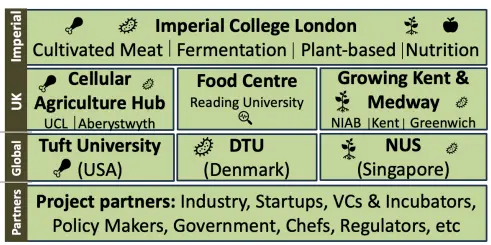NUS Medicine Partners Imperial’s Bezos Centre for Sustainable Protein to Drive Innovations in Alternative Protein Production
Published: 16 Jul 2024
The Yong Loo Lin School of Medicine (NUS Medicine) is one of the three global spokes of the newly launched Bezos Centre for Sustainable Protein, based at Imperial College London. The Centre will develop innovative and evidence-based solutions through the design, delivery, and commercialisation of alternative food products that are economically and environmentally friendly, nutritious, affordable, and tasty.
The overarching vision of the Centre is to apply cutting-edge Engineering Biology ( EngBio) to accelerate the alt-protein revolution and transform global food systems, making them more sustainable, healthy, productive and resilient by driving a step-change in consumption from conventional meat to alt-proteins.

(Source: Imperial College London)
Professor Yew Wen Shan, Deputy Director of Synthetic Biology for Clinical and Technological Innovation (SynCTI) at NUS Medicine, who is the Lead Principal Investigator for the Singapore International Spoke of the Bezos Centre for Sustainable Protein is renowned for his research on microbial EngBio and precision fermentation. His research, centered on expanding the multi-faceted interface between enzymology, biological chemistry and synthetic biology is in an area he terms “synthetic enzymology”.
Working alongside him is Dr Ji Lianghui whose expertise is in plant engineering, including developing gene editing techniques for non-conventional plants. His group at Temasek Life Sciences Laboratory pioneered the development of the red yeast (Rhodotorula toruloides) Synthetic Biology platform, which has garnered global interest.
Prof Yew and Dr Ji’s work at the Bezos Centre will be focused on engineering enzymes for biomass and food waste conversion to proteins and functional lipids. Their aim is to develop affordable workflows for the sustainable production of proteins and functional lipids using biomass and food waste. By developing advanced enzymatic solutions for the efficient conversion of feed stocks into metabolizable substrates, and downstream processing into food ingredients, they aim to greatly reduce production costs and address nutritional imbalances that come with the commercialisation of microbial fermentation technologies.

